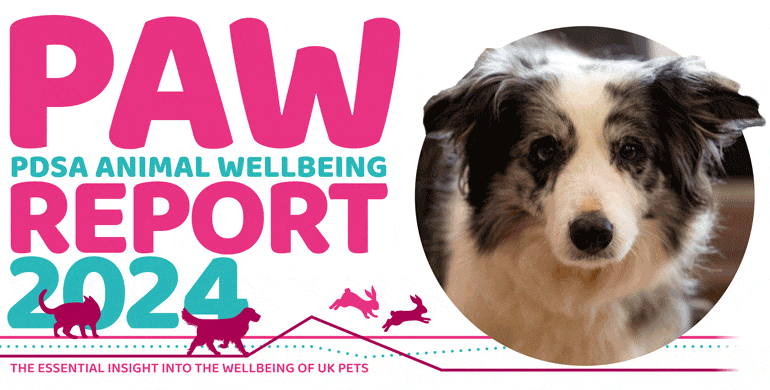
Pet Acquisition
The most common places for people to get their pets from has remained the same for several years. In 2024, dog owners were most likely to get their pets from a breeder (33%), cat owners from a rescue or rehoming centre (29%) and rabbit owners from a pet shop or garden centre (26%). However, there have been some interesting trends within the most common sources for dogs and cats.
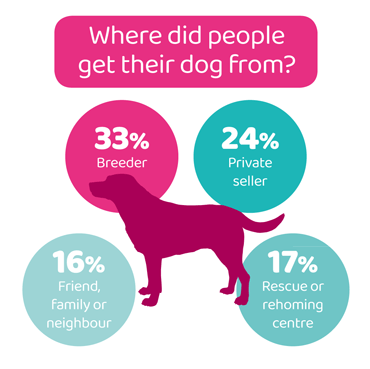
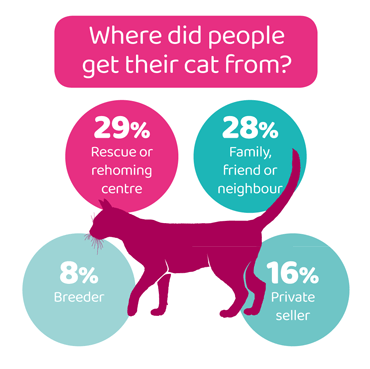
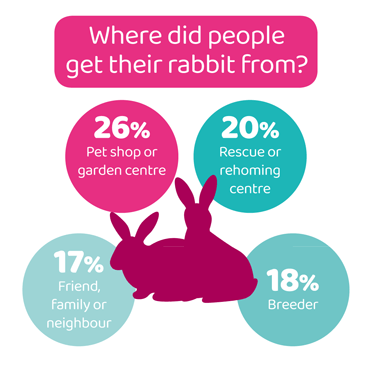
As seen in previous years, there continues to be a decrease in the proportion of dog and cat owners who acquired their pet from a rescue or rehoming centre. 17% of dog owners acquired their pet from this source in 2024, which is lower than in all years since 2018 (22%) except for 2022 when there was no statistically significant difference. This decrease is mainly for dogs from rescue or rehoming centres for UK pets (12% in 2024 compared to 18% in February 2020 and 17% in 2021). Dogs from abroad acquired from rescue or rehoming centres, either based in the UK or abroad, is higher in 2024 (5%) than in 2020 (3%), although no different to 2021 or 2022, and lower than in 2023 (6%). For cat owners, whilst the proportion acquired from rescue or rehoming centres in 2024 (29%) is not statistically significantly different from 2023 or 2022, it is less than each of the years between 2018 and 2021 (34% in 2018, 35% in 2019, 34% in February 2020, 37% in August 2020, and 38% in 2021).
The proportion of dog owners who acquired their pet from a breeder in 2024 (33%) is less than 2019 (38%) and February 2020 (37%). However, the proportion of owners (16%) who got their dog from family, friends or neighbours in 2024 is higher than 2019 (11%), February 2020 (12%), 2022 (13%) and 2023 (13%). Many rehoming organisations have reported an increased rate of relinquishment over the last 12 months2,3. The increase in dog owners acquiring their pet from family, friends or neighbours, could add additional support to the concerns that more people are making the decision to give their dogs up, and potentially passing them onto people they know as an alternative to rehoming organisations.
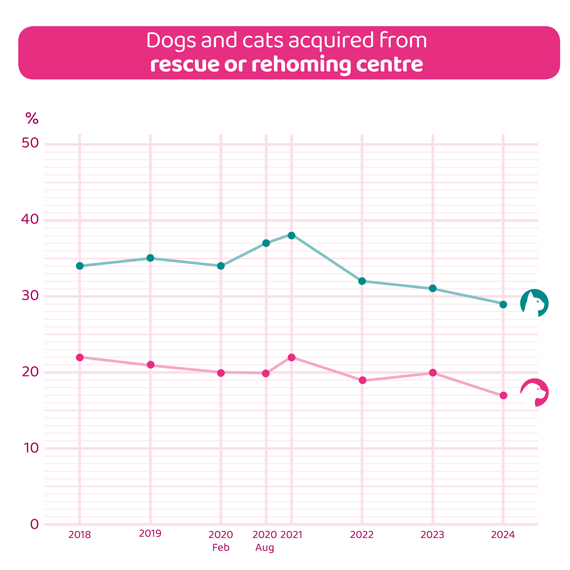
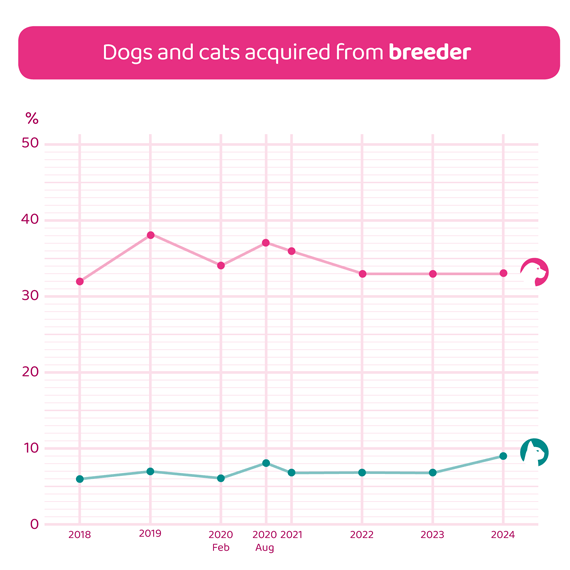
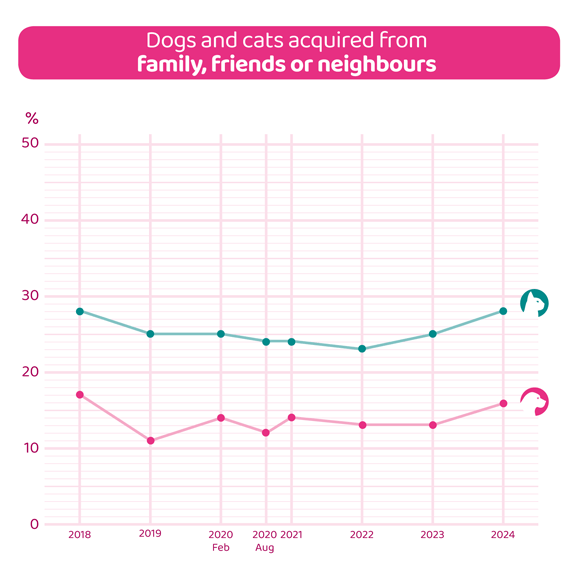
Likewise, the proportion of cats acquired from a family, friend or neighbour has increased with 2024 (28%) being higher than findings from most of the recent years (25% in 2019 and February 2020, 24% in August 2020 and 2021 and 23% in 2022).
However, the proportion of cats acquired from breeders is higher in 2024 (8%) than most of the recent years (6% in 2018, 6% in February 2020, 7% in 2021).
There has been a significant decrease in the proportion of cats acquired as a stray who ‘found the owner’ from 11% in 2018 down to 6% in 2024. This is an interesting finding, but it is difficult to interpret without additional data on the stray cat population, estimated in 2021 to be around 250,000 unowned cats living in UK towns and cities4. It could be that the stray cat population itself has decreased, or that people are less likely to take them in.
Pets from abroad
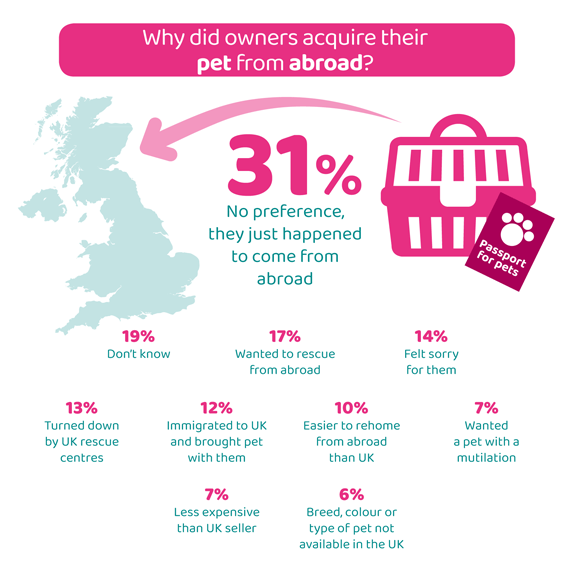
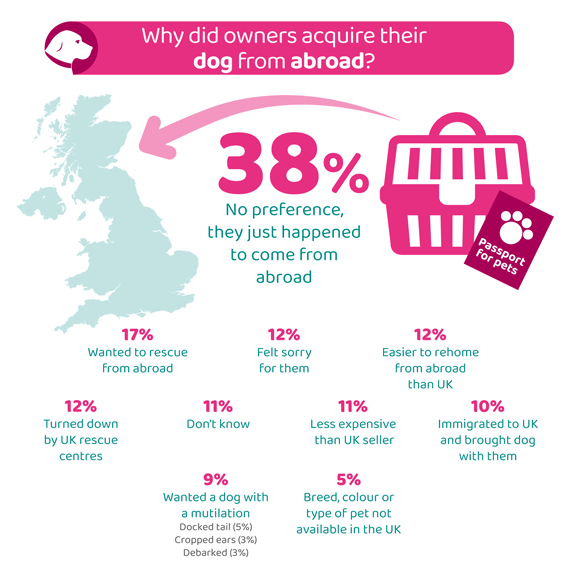
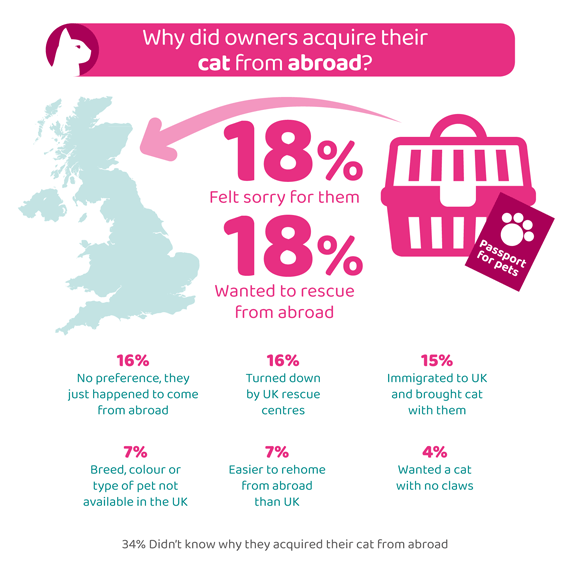
Until 2023, there had been a gradual increase in the overall proportion of the total pet population who have come from abroad since we first asked in August 2020, when the proportion was 3%. This was 6% in both 2022 and 2023, and now has decreased, with 5% of all pets in the UK in 2024 having been acquired from abroad. This equates to 640,000 dogs, 370,000 cats and 15,000 rabbits. In 2024, 5% of dogs owned for one year or less were acquired from abroad. This equates to potentially 82,000 dogs imported for pet ownership in the last 12 months.
4% of all pets came from abroad through a rescue or rehoming centre, whether a UK based centre rehoming pets from abroad (2%) or a rescue centre based abroad (1%). These proportions are no different from our 2023 findings. 1% of all pets were acquired from a breeder based outside the UK, which has remained the same since 2020.
The increase in the overall proportion of pets acquired from abroad has in previous years been primarily driven by an increase in the proportion of dogs acquired in this way. Similarly, in 2024, the proportion of dogs acquired from abroad remains significantly higher (6%) than cats (3%) or rabbits (2%), equating to 640,000 dogs from abroad living in the UK in 2024. Overall, the proportion of dogs acquired from abroad is lower than in 2023 (8%) but still higher than when first asked in August 2020 (4%). The most common source for dogs acquired from abroad remains rescue or rehoming centres (5%), whether based in the UK or abroad.
The reasons people gave for acquiring their pet from abroad have remained similar to previous years. The most common reason chosen was that the owner had no preference for where their pet came from, they just happened to come from abroad – this was higher for dog (38%) than cat owners (16%). Fewer dog owners (12%) said they acquired their dog from abroad because they were turned down by UK rescue centres than in 2023 (21%). However, more cat owners in 2024 (7%) said they acquired from abroad because rehoming from abroad is easier than rehoming in the UK (0% in 2023).
The findings continue to show a sizable proportion of dog owners acquired their pet from abroad because they wanted a dog with a mutilation (9%), unchanged from 2023. 3% of dog owners who acquired their pet in this way did so because they wanted a dog with cropped ears, equating to 21,000 dogs. These numbers demonstrate the urgent need to close the loophole in the current legislation which allows the import of dogs who have undergone this cruel procedure that is banned in the UK, a measure included in the upcoming Animal Welfare (Import of Dogs, Cats and Ferrets) Bill5. 5% of dog owners who acquired their pet from abroad told us they did this because they wanted them to have a docked tail, and 3% because they wanted their dog to be debarked. 4% of cat owners who acquired their pet from abroad told us they did so because they wanted them to be declawed, equating to 15,000 cats, which is not significantly different from our findings in 2022 and 2023.
Pre-purchase behaviour
It is important that owners understand the needs of their pet before taking on the responsibility of pet ownership, to ensure they are able to care for them properly. We asked owners what they did before they chose their pet. The most common answer selected was that they had previous experience; 36% of pet owners told us this, which was higher for rabbit owners (41%) compared to dog (34%) and cat (37%) owners.
Unsurprisingly, the internet is an important source of information for people thinking about acquiring a pet. 33% of pet owners told us they looked on the internet before choosing their pet, higher than any of the previous seven years except for August 2020 with more dog owners (40%) saying this than rabbit (34%) or cat owners (25%). 9% of owners told us they looked on social media for advice before choosing their pet. It can be very difficult to determine the reliability of information on social media and online, highlighting the importance of ensuring accurate, evidence-based information is readily available in accessible online formats.
9% of pet owners took advice from a veterinary professional before choosing their pet, higher than for any of the other previous seven years in which this question was asked (e.g. 5% in 2017). The proportion of owners who took advice from a veterinary professional before choosing their pet was higher for rabbit (12%) and dog (10%) owners than cat owners (7%). It is encouraging to see this trend - PDSA has championed the concept of ‘pre-purchase’ consultations for prospective owners with a vet or vet nurse since the launch of our ‘Which Pet?’ consultation framework in 2015. This was designed to help vet professionals guide potential owners through all the areas they need to consider before taking on a pet, including the 5 Welfare Needs and the time, cost and lifestyle implications that come with pet ownership.
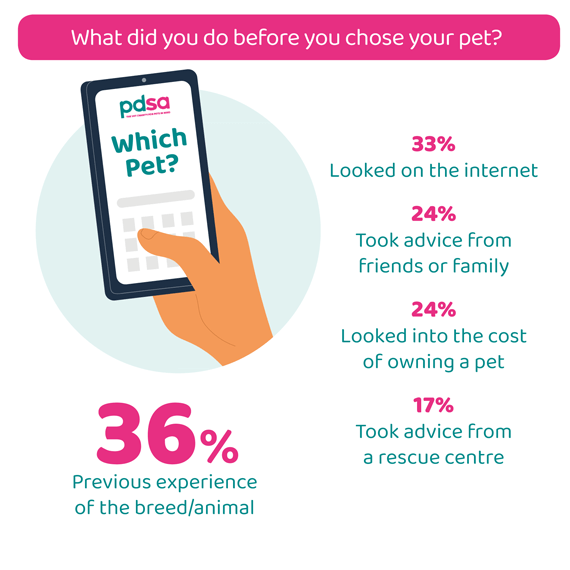
Only 24% of owners looked into the cost of owning a pet before they chose them. This has increased since we first asked the question in 2022 when 18% of owners told us they had done this, but still remains worryingly low, especially considering that our 2023 Report found that a significant proportion of owners (60%) underestimate the minimum monthly cost of owning a pet. The proportion of owners who looked into the cost of owning a pet before they chose them is higher for dog (29%) and rabbit (26%) owners than cat owners (17%).
13% of pet owners told us they didn’t do anything before choosing their pet. This has continued to decrease from 19% in February 2020, a positive finding that may reflect greater understanding by owners of the need to be seek knowledge and advice before taking on the responsibility of pet ownership. The proportion of pet owners who didn’t do anything before choosing their pet is higher for cat owners (18%) than for dog or rabbit owners (both 10%).
Owners who hadn’t done any research before choosing their pet were less likely to have got their pet from a breeder (7%) or a rescue or rehoming centre (17%) compared to owners who had done research (25% and 24% respectively), which could reflect the support given by these sources to owners. Perhaps unsurprisingly, as these decisions may need to be taken at short notice, owners who have not done any research before acquiring their pet are more likely to have rehomed their pet from a family member, friend or neighbour (32%), or found a stray (9%) compared to those who had done research (18% and 2% respectively). Owners who hadn’t done any research before choosing their rabbit were less likely to have got their rabbit from a breeder (4%) or a rescue or rehoming centre (14%) and more likely to have got from a pet shop or garden centre (36%) compared to those who had undertaken some research (20%, 21%, and 25% respectively). 15% of rabbit owners who acquired their pet from a pet shop or garden centre told us they had not done any research before acquiring their pet. It is important that businesses licensed to sell pets ensure the animals they sell are going to suitable homes, as well as providing owners with the knowledge of what they need to care for their pet.
Understanding of breeder licensing regulations, including how to confirm if a breeder is licensed remains low amongst owners, with only 35% of dog owners who acquired their pet from a UK breeder checking if the breeder was licensed. Significant work is needed to raise awareness of the regulations amongst the public, as well as improving access to the licensing information, if the regulations are to meet their aim of improving the welfare of puppies and breeding dogs.
There are some important steps owners should take when looking for a reputable breeder that help avoid low welfare breeding establishments. We asked owners who got their pet from a UK breeder what they did before taking their pet home. 73% said they saw their pet with their mum, higher for dog owners at 75%, than cat (63%) and rabbit owners (51%). It is concerning that 25% of dog owners are still failing to take the vital step of seeing their pet with their mum before taking them home and highlights the need for ongoing campaigns to help prospective owners understand why this is so important. 52% of pet owners who acquired their pet from a UK breeder visited their pet on more than one occasion before taking them home, higher for dog owners (56%), than cat (37%) and rabbit owners (32%). This is no different than in 2022 when this question was last asked.
23% of dog owners said they checked the breeder would complete some form of contract such as the Puppy Contract and 8% of cat owners checked their breeder would complete something like the Kitten Checklist. Developed by a collaboration of animal welfare organisations, these tools encourage the responsible breeding and buying of puppies and kittens - ensuring buyers have all the information they need to make an informed decision and allowing responsible breeders to set themselves apart by demonstrating the care and attention they have put into breeding happy and healthy pets. Raising awareness of these tools would help owners avoid low welfare breeding establishments such as puppy farms.
“It’s encouraging to see more owners taking the opportunity to speak to a vet and undertake a pre-purchase consultation before taking the leap into pet ownership. Impulse buys and poor research into the suitability of a pet can lead to a heart-breaking experience for families who subsequently have to rehome pets, but can also have a significant impact on the welfare of the animal. The findings show good progress but there’s still more to do.”
Dr Anna Judson, BVSc MSc MRCVS, President of the British Veterinary Association

Footnotes
2 https://www.theguardian.com/world/2023/oct/28/animal-refuges-in-britain-are-full-to-bursting-as-owners-give-up-pets-in-cash-crisis?ref=biztoc.com
3 https://www.cats.org.uk/about-cp/cats-report
4 McDonald J, Finka L, Foreman-Worsley R, Skillings E, Hodgson D. Cat: Empirical modelling of Felis catus population dynamics in the UK. PLoS One. 2023 Jul 12;18(7):e0287841. doi: 10.1371/journal.pone.0287841
5 https://commonslibrary.parliament.uk/research-briefings/cbp-9981/
